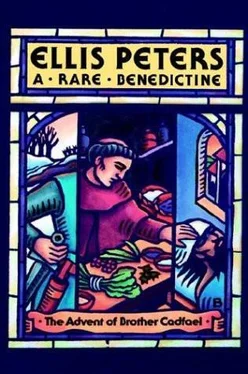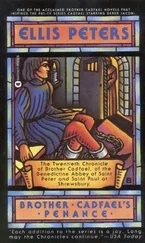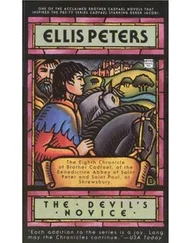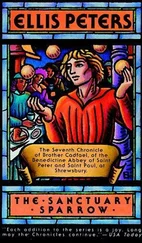Ellis Peters - A Rare Benedictine
Здесь есть возможность читать онлайн «Ellis Peters - A Rare Benedictine» весь текст электронной книги совершенно бесплатно (целиком полную версию без сокращений). В некоторых случаях можно слушать аудио, скачать через торрент в формате fb2 и присутствует краткое содержание. Жанр: Исторический детектив, на английском языке. Описание произведения, (предисловие) а так же отзывы посетителей доступны на портале библиотеки ЛибКат.
- Название:A Rare Benedictine
- Автор:
- Жанр:
- Год:неизвестен
- ISBN:нет данных
- Рейтинг книги:5 / 5. Голосов: 1
-
Избранное:Добавить в избранное
- Отзывы:
-
Ваша оценка:
- 100
- 1
- 2
- 3
- 4
- 5
A Rare Benedictine: краткое содержание, описание и аннотация
Предлагаем к чтению аннотацию, описание, краткое содержание или предисловие (зависит от того, что написал сам автор книги «A Rare Benedictine»). Если вы не нашли необходимую информацию о книге — напишите в комментариях, мы постараемся отыскать её.
A Rare Benedictine — читать онлайн бесплатно полную книгу (весь текст) целиком
Ниже представлен текст книги, разбитый по страницам. Система сохранения места последней прочитанной страницы, позволяет с удобством читать онлайн бесплатно книгу «A Rare Benedictine», без необходимости каждый раз заново искать на чём Вы остановились. Поставьте закладку, и сможете в любой момент перейти на страницу, на которой закончили чтение.
Интервал:
Закладка:
Ellis Peters
A Rare Benedictine
THE ADVENT OF BROTHER CADFAEL
INTRODUCTION
BROTHER CADFAEL SPRANG TO LIFE SUDDENLY AND UNEXPECTEDLY WHEN HE WAS ALREADY APPROACHING SIXTY, mature, experienced, fully armed and seventeen years tonsured. He emerged as the necessary protagonist when I had the idea of deriving a plot for a murder mystery from the true history of Shrewsbury Abbey in the twelfth century, and needed the high mediaeval equivalent of a detective, an observer and agent of justice in the centre of the action. I had no idea then what I was launching on the world, nor to how demanding a mentor I was subjecting myself. Nor did I intend a series of books about him, indeed I went on immediately to write a modern detective novel, and returned to the twelfth century and Shrewsbury only when I could no longer resist the temptation to shape another book round the siege of Shrewsbury and the massacre of the garrison by King Stephen, which followed shortly after the prior’s expedition into Wales to bring back the relics of Saint Winifred for his Abbey. From then on Brother Cadfael was well into his stride, and there was no turning back.
Since the action in the first book was almost all in Wales, and even in succeeding ones went back and forth freely across the border, just as the history of Shrewsbury always has, Cadfael had to be Welsh, and very much at home there. His name was chosen as being so rare that I can find it only once in Welsh history, and even in that instance it disappears almost as soon as it is bestowed in baptism. Saint Cadog, contemporary and rival of Saint David, a powerful saint in Glamorgan, was actually christened Cadfael, but ever after seems to have been ‘familiarly known’, as Sir John Lloyd says, as Cadog. A name of which the saint had no further need, and which appears, as far as I know, nowhere else, seemed just the thing for my man. No implication of saintliness was intended, though indeed when affronted Saint Cadog seems to have behaved with the unforgiving ferocity of most of his kind, at least in legend. My monk had to be a man of wide worldly experience and an inexhaustible fund of resigned tolerance for the human condition. His crusading and seafaring past, with all its enthusiasms and disillusionments, was referred to from the beginning. Only later did readers begin to wonder and ask about his former roving life, and how and why he became a monk.
For reasons of continuity I did not wish to go back in time and write a book about his crusading days. Whatever else may be true of it, the entire sequence of novels proceeds steadily season by season, year by year, in a progressive tension which I did not want to break. But when I had the opportunity to cast a glance behind by way of a short story, to shed light on his vocation, I was glad to use it.
So here he is, not a convert, for this is not a conversion. In an age of relatively uncomplicated faith, not yet obsessed and tormented by cantankerous schisms, sects and politicians, Cadfael has always been an unquestioning believer. What happens to him on the road to Woodstock is simply the acceptance of a revelation from within that the life he has lived to date, active, mobile and often violent, has reached its natural end, and he is confronted by a new need and a different challenge.
In India it is not unknown for a man who has possessed great power and wealth to discard everything when he reaches a certain age recognisable to him when it comes not by dates and times, but by an inward certainty put on the yellow robe of a sannyasi, and go away with nothing but a begging bowl, at once into the world and out of it.
Given the difference in climate and tradition between the saffron robe and the voluminous black habit, the solitary with the wilderness for his cloister, and the wall suddenly enclosing and embracing the traveller over half the world, that is pretty much what Cadfael does in entering the Rule of Saint Benedict in the Abbey of Saint Peter and Saint Paul, at Shrewsbury.
Thereafter, on occasions and for what he feels to be good reasons, he may break the rules. He will never transgress against the Rule, and never abandon it.
Ellis Peters, 1988
A LIGHT ON THE ROAD TO WOODSTOCK
THE KING’S COURT WAS IN NO HURRY TO RETURN TO ENGLAND, that late autumn of 1120, even though the fighting, somewhat desultory in these last stages, was long over, and the enforced peace sealed by a royal marriage. King Henry had brought to a successful conclusion his sixteen years of patient, cunning, relentless plotting, fighting and manipulating, and could now sit back in high content, master not only of England but of Normandy, too. What the Conqueror had misguidedly dealt out in two separate parcels to his two elder sons, his youngest son had now put together again and clamped into one. Not without a hand in removing from the light of day, some said, both of his brothers, one of whom had been shovelled into a hasty grave under the tower at Winchester, while the other was now a prisoner in Devizes, and unlikely ever to be seen again by the outer world.
The court could well afford to linger to enjoy victory, while Henry trimmed into neatness the last loose edges still to be made secure. But his fleet was already preparing at Barfleur for the voyage back to England, and he would be home before the month ended. Meantime, many of his barons and knights who had fought his battles were withdrawing their contingents and making for home, among them one Roger Mauduit, who had a young and handsome wife waiting for him, certain legal business on his mind, and twenty-five men to ship back to England, most of them to be paid off on landing.
There were one or two among the miscellaneous riff-raff he had recruited here in Normandy on his lord’s behalf whom it might be worth keeping on in his own service, along with the few men of his household, at least until he was safely home. The vagabond clerk turned soldier, let him be unfrocked priest or what he might, was an excellent copyist and a sound Latin scholar, and could put legal documents in their best and most presentable form, in good time for the King’s court at Woodstock. And the Welsh man-at-arms, blunt and insubordinate as he was, was also experienced and accomplished in arms, a man of his word, once given, and utterly reliable in whatever situation on land or sea, for in both elements he had long practice behind him. Roger was well aware that he was not greatly loved, and had little faith in either the valour or the loyalty of his own men. But this Welshman from Gwynedd, by way of Antioch and Jerusalem and only God knew where else, had imbibed the code of arms and wore it as a second nature. With or without love, such service as he pledged, that he would provide.
Roger put it to them both as his men were embarking at Barfleur, in the middle of a deceptively placid November, and upon a calm sea.
“I would have you two accompany me to my manor of Sutton Mauduit by Northampton, when we disembark, and stay in my pay until a certain lawsuit I have against the abbey of Shrewsbury is resolved. The King intends to come to Woodstock when he arrives in England, and will be there to preside over my case on the twenty-third day of this month. Will you remain in my service until that day?”
The Welshman said that he would, until that day or until the case was resolved. He said it indifferently, as one who has no business of any importance anywhere in the world to pull him in another direction. As well Northampton as anywhere else. As well Woodstock. And after Woodstock? Why anywhere in particular? There was no identifiable light beckoning him anywhere, along any road. The world was wide, fair and full of savour, but without signposts.
Alard, the tatterdemalion clerk, hesitated, scratched his thick thatch of grizzled red hair, and finally also said yes, but as if some vague regret drew him in another direction. It meant pay for some days more, he could not afford to say no.
Читать дальшеИнтервал:
Закладка:
Похожие книги на «A Rare Benedictine»
Представляем Вашему вниманию похожие книги на «A Rare Benedictine» списком для выбора. Мы отобрали схожую по названию и смыслу литературу в надежде предоставить читателям больше вариантов отыскать новые, интересные, ещё непрочитанные произведения.
Обсуждение, отзывы о книге «A Rare Benedictine» и просто собственные мнения читателей. Оставьте ваши комментарии, напишите, что Вы думаете о произведении, его смысле или главных героях. Укажите что конкретно понравилось, а что нет, и почему Вы так считаете.












